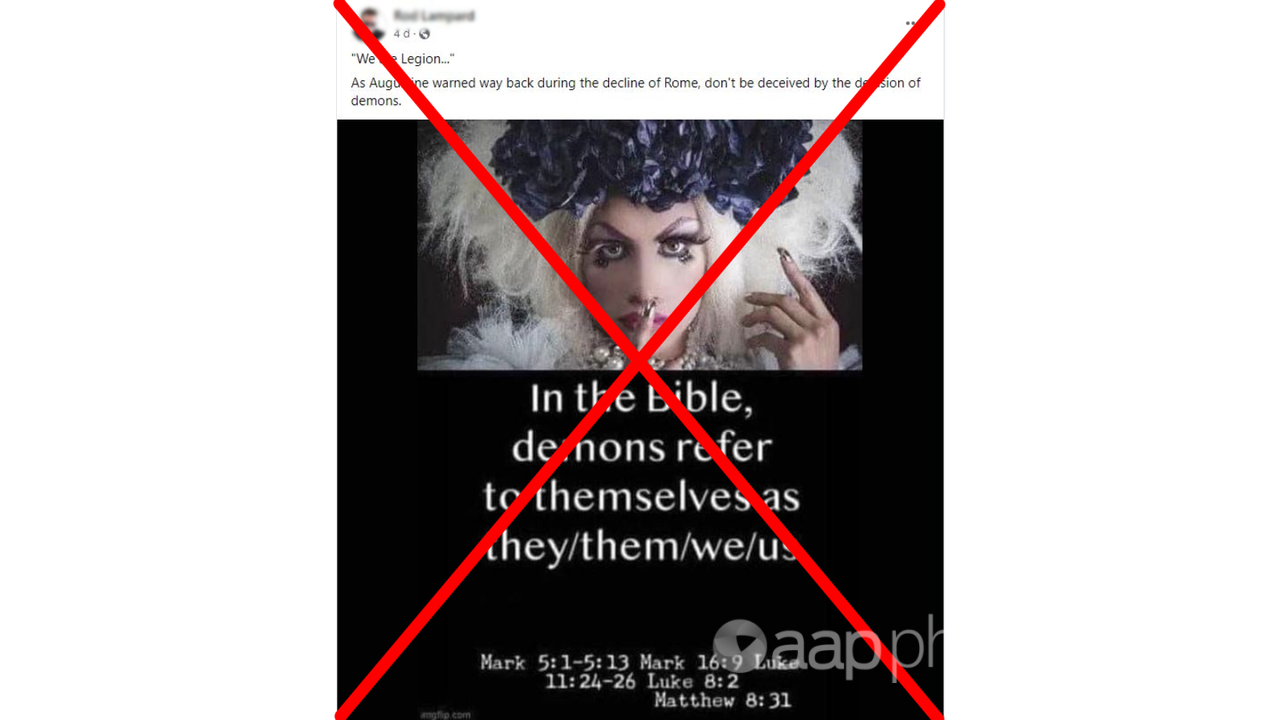Facebook users are quoting scripture to claim Biblical demons use gender-neutral pronouns.
The viral posts refer to several passages in the New Testament, claiming the evil spirits refer to themselves with the pronouns they/them/we/us.
But the claim is false. The uses of they/them/we/us in the cited passages are only used in the plural sense to refer to groups.
Pronouns have traditionally taken the form of singulars (I/me/he/she) or plural (we/us/they/them).

Some transgender and gender non-conforming people identify with the gender-neutral pronouns they/them instead of he/him or she/her.
We/us are generally only used in a plural sense and they/them/we/us are typically not used to refer to oneself, with the pronouns I/me already non-binary.
The Facebook posts appear to draw a link with the pronoun usage of transgender and gender non-conforming people, including here, here and here.
Some of the posts are far more explicit than others such as here, here and here.
It is unclear which version of the Bible the post is referring to. AAP FactCheck tested the claims against various versions, with the below passages are taken from perhaps the most widely known, the King James Bible.
The first cited chapter is Mark 5 which tells the story of Jesus restoring a “demon-possessed man”.
At no point does the demon use the singular they/them to refer to himself. Instead, he uses the plural we/us to refer to himself and his fellow demons.
This is evident in Mark 5:12-13, which reads: “And all the devils besought him, saying, Send us into the swine, that we may enter into them. And forthwith Jesus gave them leave. And the unclean spirits went out, and entered into the swine.”
The second cited passage is Mark 16, which tells the story of Jesus’s resurrection and his encounter with Mary Magdalene.
The post refers to the use of “they”. However, in the verse that pronoun is clearly used in a plural sense to refer to those who had been with Jesus. The passage also refers to Magdalene as “she”.
“Now when Jesus was risen early the first day of the week, he appeared first to Mary Magdalene, out of whom he had cast seven devils,” Mark 16:9 reads.
“And she went and told them that had been with him, as they mourned and wept. And they, when they had heard that he was alive, and had been seen of her, believed not.”

The post also mentions Luke 8:2, but it’s not clear what in that verse, or the surrounding passage about Jesus explaining a parable to a group of people, the Facebook user is referring to.
Jesus repeatedly uses “they” but it is clear this is used as a plural pronoun in the context (Luke 8:10-16).
The post also cites Luke 11:24-26. However, the “unclean spirit” in question is referred to on several occasions as he/him.
In Matthew 8:31 the use of “us” is clearly used in the plural sense to refer to “the devils” referenced at the start of the verse.
Contrary to the post, the most evil of all spirits in the Bible, the devil, is referred to as he/him on numerous occasions, including in Matthew 4 and Genesis 3.
Regardless, the use of they is nothing new, with mentions in literature dating back to the 1300s. References can also be found in Geoffrey Chaucer’s The Canterbury Tales, Shakespeare’s Hamlet and Jane Austin’s Pride and Prejudice.
The Verdict
The claim demons use the pronouns they/them/we/us in the Bible is false.
The pronouns are used in the plural sense to refer to a group in the passages cited.
False – The claim is inaccurate.
AAP FactCheck is an accredited member of the International Fact-Checking Network. To keep up with our latest fact checks, follow us on Facebook, Twitter and Instagram.
All information, text and images included on the AAP Websites is for personal use only and may not be re-written, copied, re-sold or re-distributed, framed, linked, shared onto social media or otherwise used whether for compensation of any kind or not, unless you have the prior written permission of AAP. For more information, please refer to our standard terms and conditions.


















